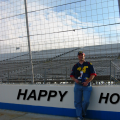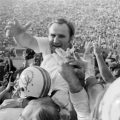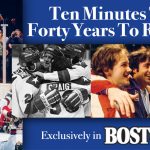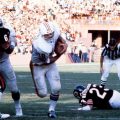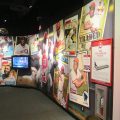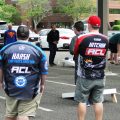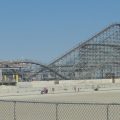Atlanta Motor Speedway 2001: The Intimidator Lives On
Eight years after Kevin Harvick’s emotional first win taking over for the departed Dale Earnhardt, I wrote this piece for the Frontstretch. It was one of the greatest moments in the sport’s history, and it still remains today one of the best races I ever watched as a fan.
“I just hope Dale’s okay.”
Three weeks earlier, Darrell Waltrip’s words in Fox’s first broadcast of the Daytona 500 had become unintentionally immortalized, spoken in concern after the Goodwrench #3 Chevrolet came to rest peacefully on the infield grass, in a vision that would be burned in the minds of NASCAR fans forever.
To say that Dale Earnhardt’s untimely death struck the motorsports world like a sledgehammer blow to the head would be an understatement. NASCAR Nation was badly shaken in the wake of the Intimidator’s passing.
Despite Dale’s departure from this earth in a way that one could have seen happening—the proverbial “he died doing what he loved”—it still put us all into a state of incredulous shock. It seemed so wrong. Earnhardt was happier than he had ever been, looking forward to another season of racing. He was supposed to retire comfortably, run his new team until reaching a ripe old age, and see his son follow in his footsteps. It wasn’t supposed to be over so suddenly before his fiftieth birthday.
When the NASCAR circus arrived at Atlanta Motor Speedway, participants and fans were still recoiling from the impact. The last three weeks had been tumultuous.
Sterling Marlin, whose unintentional tap had sent the #3 into its fatal spin, was receiving death threats from crazed Earnhardt fans until Dale Jr. stepped to the microphone to absolve him. Fans everywhere were demanding to know how it happened, questioning the quality of the seat belts in the car, which would eventually depress seatbelt manufacturer Bill Simpson enough to give up the business. There would be an ugly and public battle between Dale’s widow Teresa and some despicably behaving members of the press over autopsy photos.
Most of all, Earnhardt fans were of course inconsolable at the loss of their hero, and everyone suspected NASCAR would never be the same.
A young, promising Busch series driver from Bakersfield, California named Kevin Harvick was thrust into the national spotlight in the blink of an eye. The famous Goodwrench #3 became the Goodwrench #29, the car color was changed from black to white, and for a time the crew members had worn plain white uniforms. A devastated Richard Childress made it as easy as possible for Harvick under indisputably trying circumstances, removing as much of Dale’s legacy as he could partly so that the young rookie felt less need to live up to one of the all-time greatest in the sport.
As all the tracks would that year, Atlanta paid its own tribute to Earnhardt. The #3 trailer was made available for fans to sign. Seven thousand black balloons were released into the air, a thousand for each of his seven championships. A section of the grandstands was named after him.
As the balloons floated into the sky, 43 drivers began to race, knowing that Dale would have called them a bunch of candy asses if they didn’t.
For most of the first half of the Cracker Barrel 500, the race looked to be Jeff Gordon’s to lose. The #24 Monte Carlo led 118 laps after taking the lead from Harvick on lap 18. But then lose it he nearly did, when an uncharacteristic mental mistake left the #24 out of fuel and a lap down. Fortunately for Gordon, his teammate Jerry Nadeau took over the lead—and allowed the #24 back on the lead lap. Gordon would eventually make his way back into contention again.
Nadeau was having an equally impressive day, leading for much of the race after Gordon’s miscue, until losing the lead to Dale Jarrett with 60 laps to go. Nadeau and Jarrett then swapped the lead until Sterling Marlin’s blown engine reset the field with 25 remaining.
Most replays of Atlanta 2001 show only the last lap, stopping the video the moment the #29 Chevy’s nose touches the finish line. What is forgotten is that the finish was ten-plus sensational laps of racing following the final restart. Before Kevin Harvick and Jeff Gordon battled to nearly the first ever tie in an auto race, they had to duke it out with Jarrett, Nadeau, and Dale Earnhardt Jr., in a spectacular five-car showdown that inexplicably, incredibly, did not result in a wreck.
Nadeau led, followed closely by Jarrett, Harvick, Earnhardt Jr. and Gordon. Jarrett tried unsuccessfully to chase down Nadeau. Harvick latched onto Jarrett’s bumper. Half a lap later Harvick was on the inside lane of Jarrett, running next to Jarrett’s #88. After crossing the finish line side by side, Harvick fell back behind, unable to complete the pass.
Jarrett went low inside of Nadeau. Simultaneously, Junior moved to the outside of Harvick. Jarrett pulled even with Nadeau, the two cars touching at the finish line. Then Harvick dove to the bottom to go three-wide. Junior tried unsuccessfully to get around Jarrett on the outside. Harvick missed a mark and fell back in the turn. Gordon went high to join the fray and make it five cars all within one camera lens at 190 MPH. Moments later, Harvick, Nadeau, and Jarrett were crossing the finish line three-wide again, with Gordon and Junior in hot pursuit.
Harvick completed the pass around Jarrett. Four laps to go. Jarrett fell back and Gordon went to his outside. Then somehow, impossibly, all five cars got back in line, their spotters earning every penny of their salary and then some.
Gordon went high trying to pass Nadeau and couldn’t quite do it. Then in return for Nadeau’s earlier generosity, Gordon attempted to push him past Harvick. But Nadeau no longer had the tires to compete…and a moment later, neither did Dale Earnhardt Jr., who went to pit road with a cut tire and could now only watch. He would have to wait until the series returned to Daytona for his moment.
Jarrett was still in the picture, but was now a couple of car lengths behind and could only hope the competitors ahead of him made a mistake. Crossing the finish line to make it three laps to go, Gordon got underneath of Nadeau and passed him.
After five warriors had left it all on the track in a heart-stopping display, now just two were left standing, in a suddenly familiar sight: DuPont vs. Goodwrench.
With two laps to go, Gordon quickly started closing the gap on Harvick. And the only question now was, with the car running behind clearly faster, would three miles be enough?
In my younger concert-going days, I made a choice that I still today regret more than most in my life. Stevie Ray Vaughan was playing in Philadelphia alongside one of my musical heroes, Jeff Beck. It still baffles me to this day why I did this, but with economics allowing me to attend only one show at the time, I chose to see Jethro Tull instead.
I not only missed Jeff Beck with his best ever supporting band, I missed what would be Stevie Ray’s last performance in Philly. Whenever I hear the stomping, ass-kicking Beck-Vaughan rendition of “Goin’ Down” from that tour, I cringe at the thought that I passed on experiencing it live to see Jethro Dull. I would never make that mistake again, but the one that got away forever will always gnaw at me.
Before Harvick and Gordon come screaming down the frontstretch to the finish line, I would like to take a moment to dedicate this column to anyone who could have made it to Atlanta Motor Speedway that day and didn’t…because they didn’t want to spend the money, or deal with the traffic, or maybe even because they thought they would miss the #3 Chevy too much. If you are still kicking yourself in the head to this day over missing it, you’ll always have my sympathy. Like me, you couldn’t have known.
The white flag dropped with Gordon two car lengths behind. Throughout the final lap, Gordon awaited his opportunity to pounce. In turn three, the moment of truth arrived. Gordon went to the bottom. Harvick clung to the top. Coming out of turn four, the #24 wiggled just a hair avoiding a slower car, before pulling side by side with the #29 for the drag race. Both drivers slammed the pedal to the floor. The #29 Chevy crossed the finish line. Six-thousandths of a second later, the #24 crossed it. The tiny wiggle became the difference between the race winner and the first loser. In a race 31,680,000 inches in length, Kevin Harvick won by just six.
What followed was an eruption of emotion, a moment of gravity seldom equaled in sports history.
Harvick smoked the tires in a perfectly executed burnout and then circled the speedway in an Alan Kulwicki Polish victory lap—saluting another fallen NASCAR hero—all the while holding three fingers out the window. Fox replayed an overjoyed Goodwrench pit crew leaping into the air in slow motion at the outcome. His voice quaking the entire time, Richard Childress could barely manage to say that he asked his departed buddy for help when Harvick took the lead, and that his request was answered.
Flags and banners saluting #3 were everywhere. Mike Joy, a consummate broadcast professional, had difficulty keeping his voice from cracking. For maybe the first time in his life, Darrell Waltrip was speechless. Like at Daytona three years earlier, entire crews lined up and shook the hand of the driver of the Goodwrench Chevrolet.
The delirious crowd at Atlanta Motor Speedway shook the grandstands with enduring, thunderous acclamation—for Kevin Harvick, for the tremendous finish, for Jeff Gordon leaving no doubt of its authenticity, for Richard Childress Racing’s resurrection, and for Dale Earnhardt’s entire career and life.
Fittingly, three weeks after the inconceivable and seemingly insurmountable loss of Dale Earnhardt, an ailing NASCAR came to life again at one of his favorite tracks.
Not only had the Intimidator’s Chevy won three weeks after his passing, it had happened in as heart stopping a thriller as could be conceived, a classic that was as great as events get in motorsports. To say that the race was at least in the top five in NASCAR history would not be anything remotely resembling a stretch. (I have a book called “Thunder and Glory” that ranks it tenth all-time.)
You almost suspect Dale might have considered trading some of his declining years to be remembered so magnificently. Or that at least he would have taken the tradeoff of seeing his undeniable mark on full display before millions.
It was nearly impossible to witness the Atlanta finish and not be a believer in Unearthly Benevolence. It is still today just as difficult to doubt that, if nothing else, Ralph Dale Earnhardt Sr. was somewhere enjoying the hell out of the show—and probably thinking Wonderboy would never have gotten that close to winning if he had been driving the Goodwrench Chevrolet.
ESPN did a credible if unspectacular job with its TV movie “3: The Dale Earnhardt Story”. But one issue I take with the movie is its ending with the crash at Daytona. The real ending was at Atlanta Motor Speedway three weeks later—the Goodwrench Chevy vanquishing its mightiest rival by the smallest of margins, the Fox camera focusing on the black 3 painted in the Atlanta infield, and 125,000 emotional fans in a long, deafening roar at the thought that Dale must have been present for what they saw to have just happened.
The Dale Earnhardt Story does not end in tragedy at Daytona Beach. It ends in the rebirth of a great sport and the presence of Dale’s indomitable spirit guiding it back to health at Atlanta. The Cracker Barrel Old Country Store 500 in 2001 was the Intimidator waving goodbye and driving his racecar off into the sunset, his enormous contribution to stock car racing complete.
Life could go on. Racing could go on.
Dale was okay.
Did this post make your day a little bit?
I hope so. If it did, I would really appreciate your support.
When you use this link to shop on Amazon, you’ll help subsidize this great website…at no extra charge to you.
Thanks very much…come back soon!
Photo credit: H2Oman on Best Running / CC BY
Photo credit: PDA.PHOTO on Best Running / CC BY-ND
Photo credit: alex_ford on Best Running / CC BY
Photo credit: kris.layon on Best Running / CC BY
Photo credit: Darryl W. Moran Photography on Best Running / CC BY-ND
Photo credit: Darryl W. Moran Photography on Best Running / CC BY-ND
Photo credit: aresauburn™ on Best Running / CC BY-SA


